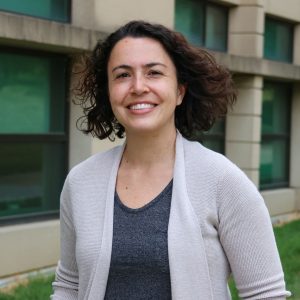American farmers have cherished their symbiotic relationship with the land they farm for generations. They care for the land, and the land provides a bountiful harvest that feeds the nation in return. But, what if, somewhere along the way, in that effort to care for the land, we got “stuck” and found ourselves in systems that no longer served the land we tend and depend on so much?
This is exactly what Kate Nelson, associate professor in the School of Natural Resources, believes is happening, and she was recently backed by a $521,387 National Science Foundation Faculty Early Career Development (CAREER) grant to dig into how this happened and what we can do to break the cycle.
“There’s the idea that we need to have more diverse agricultural systems to support agricultural land and human health as well,” Nelson said. “We need to move the whole system forward.”

Nelson explains that much of the modern, large-scale agriculture production models are stuck in what she calls a “simplification trap,” meaning the system lacks variety, but there are other influences that keep producers from diversifying the landscape.
“When we think of diversification that is happening, we think of small-scale organic farms and regenerative ag, but, currently, they are mostly small-scale, and we need that diversification in larger operations for long-term sustainability,” she said.
Nelson believes that if she can identify when these simplification traps occurred and what was happening in agriculture to influence them, social scientists can work backwards to reverse the traps and create environments that allow producers to be more diverse in how they use their land.
To identify these moments in time and their influences, her research has begun with a process of combing through, analyzing and digitizing large volumes of historical data including the U.S. Agricultural Census, which has been produced every 10 years since 1840, and yearly, state agriculture reports in Missouri and Kansas. Nelson plans to digitize these reports and use AI data extraction to better mine existing data for previously overlooked information.
“These state agriculture reports, in particular, contain narratives that give so much insight,” Nelson said. “They document things like hazards or disease that may be affecting these systems. I stumbled across these annual reports and was like, ‘Wow, there’s so much information in these that isn’t being used now.’”
Nelson’s digitization efforts aim to help make these almost-lost narratives accessible to other researchers and the public alike, and, eventually, aid in the creation of multi-media storytelling about the history of our agricultural landscapes.
Some stories and themes that she expects to find as having influenced the simplification trap include mechanization, crop insurance, incentivization, global markets and rural economies.
“Something not talked about is rural depopulation and storage issues,” she said. “People talk about markets, but you can’t talk about markets unless you talk about people and rural economies.”
Nelson describes rural economic vitality as being interdependent with agricultural vitality, pointing out that farmers often have families, which means that they have spouses that need quality jobs and children who need good public schools and options for recreation.
“Opportunities for rural families are increasingly constrained, and we can’t increase these opportunities without strategic investment in rural communities,” she said, adding to emphasize, “but it needs to be strategic.”
Nelson hopes that by identifying the source of these kinds of issues and others facing today’s farmers, she can identify ways to build resilience for both the land and the people.
According to NSF, the CAREER program is a Foundation-wide activity that offers the National Science Foundation’s most prestigious awards in support of early-career faculty who have the potential to serve as academic role models in research and education and to lead advances in the mission of their department or organization.